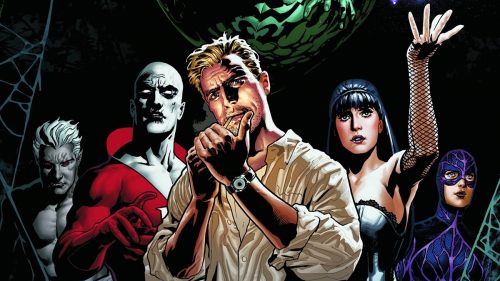We Created The Mystery Box
If JJ Abrams has one enduring contribution to pop culture, it’s undoubtedly the concept of the “mystery box.” In a TED talk that probably shouldn’t have been as feted as it was, Abrams used the metaphor of a “mystery magic box” he acquired during childhood, but never opened, to describe his approach to storytelling. Stories, he said, are mystery boxes: representing “infinite possibility,” they’re a series of reveals designed to make audiences want to see what happens next. The thought of what might happen is more important than what actually happens.
Many people took that to mean Abrams believes movies should be the kind of opaque, inscrutable paradox that many of his works - or at least their pre-release campaigns - ended up becoming. But JJ Abrams didn’t invent the mystery box, as we’ve come to know it, and he hasn’t even been its foremost orchestrator. The mystery box is bigger than the decisions made by writers and directors. It's a social phenomenon built around the perception of those decisions, and we are all complicit in it.
Like much of modern pop culture, this can be traced back to Star Wars. The Empire Strikes Back dropped what has arguably become cinema’s best-known twist upon audiences, but what it did isn’t quite as important as when it did it. Empire came out in 1980, just as Usenet message boards were becoming widely-used amongst the most fanatical Star Wars audience of all: nerds. And so the fan-theory ball began its depressing roll down Banality Hill.
An important thing to remember about Empire’s twist is that it only recontextualised things we already knew. It didn’t fill in an information hole. Nobody was unsatisfied with the story of Luke’s heritage before Empire came out. No one was desperately trying to work out who Luke’s father was. It was explained well enough previously, and ultimately wasn’t important to the straightforward space fairy tale at hand. Vader’s revelation merely made us look at prior events and ideas in a different light. You can see that throughout the Big Twist canon: The Sixth Sense, Planet of the Apes, Fight Club, and Psycho would all work just as well - albeit differently - without their climactic reveals.
Darth Vader’s Empire Strikes Back reveal sent those early Internet users into overdrive. Suddenly, people could talk about what that climactic revelation meant. People started trading theories and rumours on Usenet. Was Darth Vader lying? Was he telling the truth? Did it involve clones somehow? How and why did Obi-Wan play into the lie? This was all motivated by a single twist, and of course, it was all answered a couple years later in Return of the Jedi (not that stopped the speculation). Some of this stuff (including this gem about whether it’s “Clone Wars” or “Colon Wars”) can still be found in the dank archival recesses of the Web, and even the language used is more or less indistinguishable from today’s online vocabulary.
By the time the Star Wars prequels (and, I’d be remiss to forget, the Matrix films) rolled around, the internet’s reach had expanded dramatically. Thanks to fan sites and their accompanying message boards, millions of people could now engage in the speculation, prognostication, and wholesale invention that came to characterise fan hype. And boy, was there hype.
Again, there aren’t many mysteries in the prequels that aren’t resolved within a single film. The only major one is the identity of Darth Sidious, but that’s only a mystery for the clueless. Its mere presence, though, created a precedent for secret identities in the Star Wars universe - adding to the series’ already-present obsession with fathers and sons. The online community would have had you believe those films were riddled with conspiracies, double-ups, and hidden secrets, but in reality, they were relatively straightforward. There was some bad writing that led to unfinished narrative threads and plot contrivances, but very little intentional mystery.
What the prequel fan-theory explosion did is train fan audiences to watch movies and TV in a certain way, wherein any tiny action could be a clue to some greater mystery. Fandom, propelled along by the various incarnations of Star Wars, painted itself into a plot twist-first storytelling culture. The question of who a character “is” now means "how does this character link to everything else in their universe," rather than "who is this character?". It’s a bad way to approach stories, putting the emphasis on intellectual concepts rather than emotion and character. Stories are now puzzles, based on what fits established canon, not what’s dramatically right.
And content creators are starting to do it too.
Over the past ten years or so, filmmakers, authors, and TV producers have picked up on this habit of fandom, and begun to engineer stories around it. TV shows are particularly guilty of twist-first storytelling, using their long-form structures to tease out mysteries and keep fans guessing. The importance of driving online discussion can’t be discounted here. Pop culture viewership is driven largely by online discussion nowadays. Producers and writers must cackle with glee as they make being part of the pop-culture conversation a vital part of simply existing online. Fans obsessively create theories while accusing critics of “overthinking” their favourite properties, and all the while SEO ratings shoot through the roof.
JJ Abrams is obviously part of this shift - his most influential contribution to pop culture, Lost, is the poster child for directionless, unsatisfying mystery, and by now his mere involvement in a project is enough to spark conspiracy theories. But like every season of television he produces, Abrams is only the beginning. Everybody’s doing it now. TV shows are the worst offenders - Doctor Who is an incomprehensible web of absurd conspiracy arcs now, American Horror Story is building its own shared universe of links and connections, and I’ve lost count of the shows I’ve never touched because of how much time investment they require. Marvel films are festooned with hints at what’s to come, while the previously episodic James Bond franchise continues to foolishly go down the path of serialisation. Video games like Assassin’s Creed are filled with half-baked mysteries, sometimes not even relating to their own franchise (lookin’ at you, Portal). And bringing it full circle is Star Wars, finally striving to match its fans' hunger for puzzle-solving.
Enough’s been written about the specific mysteries in Star Wars: The Force Awakens. But it’s interesting that the only one actually presented as a mystery is Rey’s parentage. Everything else - Finn’s unknown heritage, Snoke’s “true identity” (if there even is one!), Lor San Tekka’s place in the saga - is presented matter-of-factly. We’re just expected to accept them, and if this was almost any other series, we probably would. It’s only because of the deliberate obfuscation of Rey’s background that fans assume they’re being strung along on everything else as well. Perceived mysteries are more important than actual mysteries when you interpret a film from the twist outwards.
As a result, Star Wars fan theories are in the highest of all their shitty gears right now. There are currently fan theories that Rey is Luke’s daughter; that she’s Obi-Wan Kenobi’s granddaughter; that she’s a clone of Anakin Skywalker. Finn must be Lando Calrissian’s son. Supreme Leader Snoke is Darth Plagueis; he’s Boba Fett; he’s a clone of the Emperor; he’s just some guy, you know? There’s even a fan theory centring on the use of punctuation in the opening title crawl (!). And don’t get me started on the Bigger Luke theory, which could well be satire, but would be indistinguishable from actual fan theories if so.
Works that encourage this sort of thing have a lot more work to do than works that don’t. Twists that conclude hours of painstaking mystery-building (not to mention years of detective work) have to be amazing in order to leave everyone satisfied. The longer you tease something out, the bigger the payoff has to be. In the case of Rey’s parentage, none of the infinite potential answers will ever really be “enough.” Empire’s big twist worked so well precisely because nobody saw a twist coming. In the new school of so-called mystery box storytelling, we don’t just see twists coming; we’re scanning the horizon for them constantly.
Abrams’ TED talk didn’t really discuss what we refer to nowadays as “the mystery box.” It was about the MacGuffin and how stories were about the journey, not the destination. But in putting the term out into the world, Abrams unwittingly defined a mode of storytelling he was instrumental in building. And it comes back to that autopsical way fans - like Abrams himself - dissect their favourite material. For those fans, the journey - the speculation, arguments, fakes, leaks, and augmented reality games - really is more important than the destination, the actual content. And there’s nothing wrong with enjoying that ride. But it’s leeched into the content as well, forcing everyone else along in the back seat.
Then again, this could all just be a theory.



